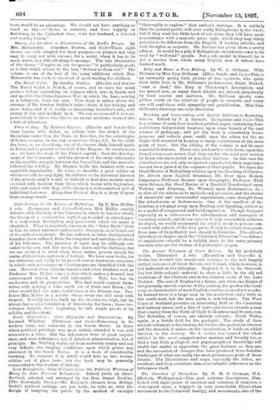Teaching and Organisation, with Special Reference to Secondary Schools. Edited
by P. A. Barnett. (Long,mans and Co.)—This is a volume of some four hundred printed pages, containing four- and-twenty independent treatises upon some branch of the vast science of pedagogy; and yet the book is remarkably homo- geneous, and reflects great credit upon the editor for the no slight skill required in keeping so many contributors at the same point of view. But the editing of the volume is not its most remarkable feature. Those who are familiar with books upon this dismal science are aware that they are for the most part written by those who have failed as practical teachers. In this ease the contributors are not only recognised experts, but their experience has not been gained at the expense of their pupils. We have the Head-Master of Haileybury writing upon the Teaching of Classics, Dr. Abbott upon English Grammar, Mr. Storr upon Modern Languages, Professor Gonner upon Geography, Professor Miall upon Science, the Head Master of a Sheffield Board-school upon Writing and Drawing, Dr. Wormell upon Mathematics, &c. ; so that all the advice as to methods and processes, and the stories of successful and unsuccessful experiments, come straight from the school-room or lecture-room. One of the smallest of the treatises, a ten-page essay upon Reading and Speaking, strikes us as a model of compressed and lucid exposition. Though designed especially as a vade-mecum for schoolmasters and managers of secondary schools, and in our opinion it very successfully achieves its object, we would recommend its careful study to persons con- cerned with schools of the first grade, if only to relieve that grade from some of its pedantry and slavery to formulas. The editor's introductory chapter upon the "Criteria in Education "—a defence of empiricism—should be a helpful tonic to the many primary teachers who are the victims of a philosophic jargon.






































 Previous page
Previous page